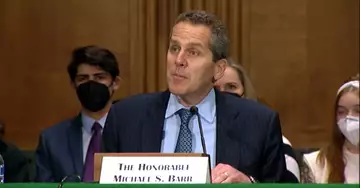Michael Barr, a former Ripple adviser nominated by President Joe Biden to lead the Federal Reserve's oversight of the U.S. financial sector, said during a Senate hearing Thursday that he sees "some potential for positive developments and also some significant risks" in cryptocurrency technology. While his time on Ripple's advisory board was not addressed during his opening testimony at a Senate Banking Committee confirmation hearing, Barr - now dean of the University of Michigan Law School's public policy department - was asked for his thoughts on current issues in the crypto industry.
"With issues like stablecoins, there could be risks to financial stability, and I think it's pretty important that Congress and regulators get a handle on and regulate those risks to financial stability," he said.
With cryptocurrencies, which people treat as investments, the main concern is investor protection, "and that's really the responsibility of other agencies."
If confirmed by the Senate, the former senior U.S. Treasury official will be the Fed's next vice chairman for oversight and will play a key role in the next steps regarding stablecoins. He will also influence the Fed's decision on whether to launch a digital dollar, which he said should be signed off on by Congress and the administration before the Fed makes a decision.
Thursday's hearing also addressed the confirmations of Jaime Lizárraga and Mark Uyeda to the Securities and Exchange Commission, where Chairman Gary Gensler plays an important role in the government's response to the rapid growth of the crypto industry.
Senator Elizabeth Warren (D-Mass.) asked all three nominees questions about cryptocurrencies and investor protection, referring to last week's TerraUSD meltdown: "It turns out [UST] wasn't that stable. If you invested $1,000 in Terra 10 days ago, you got $90 back."
"Online investor forums have been flooded with harrowing posts from investors who have lost their entire life savings," she said, adding that it "smells a lot like 2008."
Even asset-backed stablecoins such as Tether (USDT) briefly lost their bonds, she said, before questioning whether stablecoins would provide audit reports on their reserves. Uyeda said they do not.

